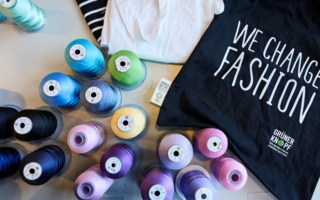09/02/2021 – Myanmar — auf Deutsch lesen
Fair Wear: Military coup – a guidance for brands
The military coup in Myanmar on January 31, 2021 is deeply concerning. Many Fair Wear members do business there. What now?

Fair Wear: “We urge all member brands and their suppliers in Myanmar to refrain from buying any goods and services from companies that are known to be linked to – or owned by – the military services of Myanmar.” Picture: Handcrafted colorful lotus fabrics made from lotus fibers in Inle Lake, Shan State in Myanmar. © sasint/stock.adobe.com
Fair Wear asks that member brands sourcing from Myanmar take steps to ensure worker safety, including protection of union members, and ensure full and on-time payment of workers during this uncertain time: “Please consult not only with your suppliers but also local and international civil society organizations, when possible.
The military coup in Myanmar that took place on 31 January 2021 is deeply concerning.
We urge the full and immediate restoration of democratic rights and institutions.
Many of our members do business in Myanmar and our hearts and prayers are with the Myanmar people for a swift, peaceful and democratic resolution to this crisis – one that does not take away the economic progress made by the hardworking people of Myanmar.
We are hoping that the situation will remain peaceful. We ask that our member brands sourcing from Myanmar take steps to ensure worker safety, including protection of union members, and ensure full and on-time payment of workers during this uncertain time.”
The situation in Myanmar is quite fluid, and while some basic services like the internet, public transportation and banking seem to be working, it is not clear what the short and long-term impact of the military’s actions will be. While everyone waits for additional information to become available, there are a few steps brands can take to help workers and suppliers.
Communicate with all suppliers and seek to understand the status of production and the situation for workers:
Is production still running?
Will the factory pay workers on the upcoming payday?
Are workers able to safely travel to the factory by regular transportation?
Have delivery times for finished goods been impacted?
What about the import of raw material/fabric?
If needed, show leniency in terms of delivery dates, particularly if suppliers must scale back production due to worker absenteeism.
Brands should honour all existing commitments made to factories.
Factories should be encouraged to ensure on-time payment of the upcoming January salaries.
Grievance mechanisms for workers should remain in place, both internal and external, and brands should follow up with their suppliers on worker grievances, as needed.
Meanwhile, and in line with Fair Wear’s Enhanced Monitoring Programme for Myanmar:
„We urge all member brands and their suppliers in Myanmar to refrain from buying any goods and services from companies that are known to be linked to – or owned by – the military services of Myanmar. More specifically: Member brands are to refrain from sourcing from factories in the three Special Economic Zones Dawei, Kyauk Phyu and Thilawa, as the legal framework is considered not to provide adequate protection of workers’ rights including proper access to grievance mechanisms. Furthermore, the development of the SEZ’s is often associated with land grabbing and forced evictions. In order not to provide (indirect) support to the military, member brands are required to refrain from sourcing from companies with known direct links to the military, including in particular with companies that fall under the economic conglomerates owned by the army, i.e. the Myanmar Economic Corporation (MEC) and the Union of Myanmar Economic Holdings (UMEH, also known as Myanmar Economic Holding Ltd. or MEHL). This includes factories that are operating from Ngwe Pinlae Industrial Zone and Pyinmabin Industrial Zone, which are owned by UMEH/MEHL.”



